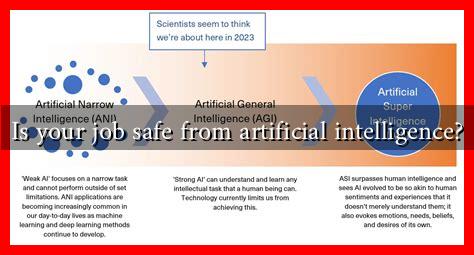-
Table of Contents
Is Your Job Safe from Artificial Intelligence?
As artificial intelligence (AI) continues to evolve and integrate into various sectors, many workers are left wondering: Is my job safe from AI? The rapid advancements in technology have led to significant changes in the job market, prompting both excitement and anxiety among employees. This article explores the impact of AI on employment, the jobs most at risk, and how workers can adapt to this changing landscape.
The Rise of Artificial Intelligence in the Workplace
AI has made remarkable strides in recent years, with applications ranging from simple automation to complex decision-making processes. According to a report by McKinsey, up to 800 million jobs worldwide could be displaced by automation by 2030. However, the same report suggests that AI could also create new job opportunities, particularly in fields that require human creativity and emotional intelligence.
Jobs at Risk: Which Roles Are Most Vulnerable?
While AI has the potential to create new jobs, certain roles are more susceptible to automation. Here are some categories of jobs that are at higher risk:
- Repetitive Tasks: Jobs that involve routine and repetitive tasks, such as data entry and assembly line work, are highly vulnerable to automation.
- Customer Service: AI chatbots and virtual assistants are increasingly handling customer inquiries, reducing the need for human customer service representatives.
- Transportation: With the development of self-driving vehicles, jobs in trucking and delivery services may face significant disruption.
- Manufacturing: Robotics and AI systems are already transforming manufacturing processes, leading to job losses in traditional roles.
Jobs That Are Safe: Where Human Skills Shine
Not all jobs are equally at risk. Certain professions are less likely to be replaced by AI due to the unique human skills they require. These include:
- Creative Professions: Jobs in art, design, and writing often require creativity and emotional depth that AI cannot replicate.
- Healthcare: While AI can assist in diagnostics, the human touch in patient care remains irreplaceable.
- Education: Teachers play a crucial role in shaping young minds, a task that requires empathy and interpersonal skills.
- Management: Leadership roles that involve strategic decision-making and team dynamics are less likely to be automated.
Adapting to the AI Revolution
As AI continues to reshape the job market, workers must adapt to remain relevant. Here are some strategies to consider:
- Upskilling: Invest in learning new skills that complement AI technologies, such as data analysis, programming, or digital marketing.
- Emphasizing Soft Skills: Focus on developing interpersonal skills, emotional intelligence, and creativity, which are difficult for AI to replicate.
- Networking: Build professional connections to stay informed about industry trends and job opportunities.
- Embracing Lifelong Learning: Stay curious and open to learning throughout your career to adapt to new technologies and methodologies.
Case Studies: Companies Embracing AI
Several companies have successfully integrated AI into their operations while also creating new job opportunities. For instance:
- Amazon: While automation has streamlined warehouse operations, the company has also created thousands of jobs in tech and management roles.
- IBM: IBM’s AI initiatives have led to the creation of new roles in AI ethics, data science, and machine learning.
Conclusion: Preparing for the Future
The question of whether your job is safe from artificial intelligence is complex and multifaceted. While certain roles are at risk of automation, many jobs will continue to require the unique skills that only humans possess. By embracing lifelong learning, upskilling, and focusing on soft skills, workers can better prepare themselves for the future job market. As AI continues to evolve, those who adapt will not only survive but thrive in this new landscape.
For more insights on the impact of AI on jobs, you can visit McKinsey’s Future of Work report.

